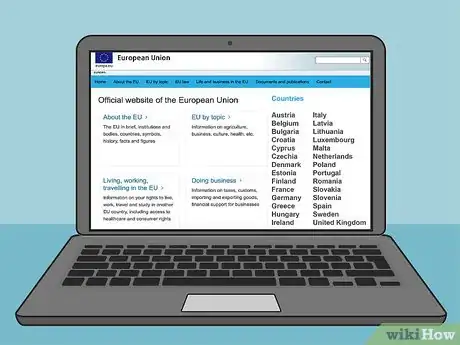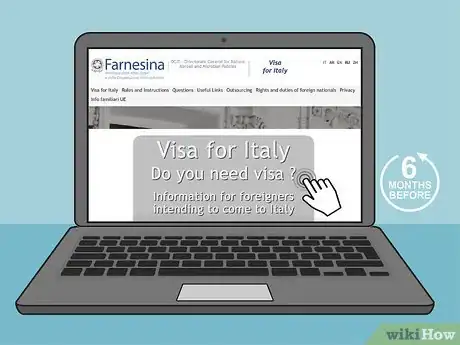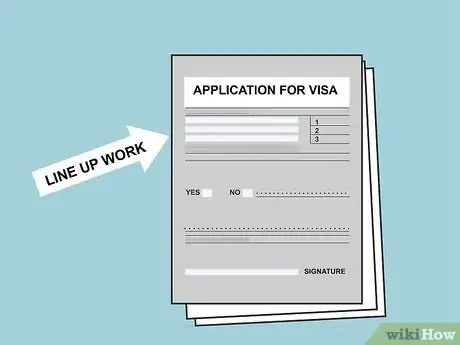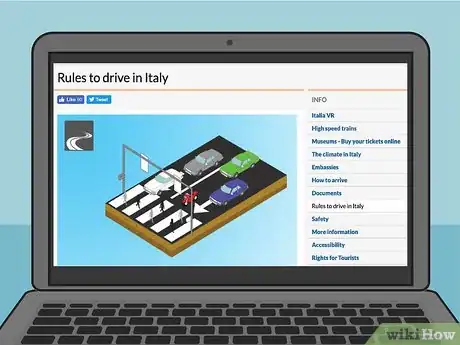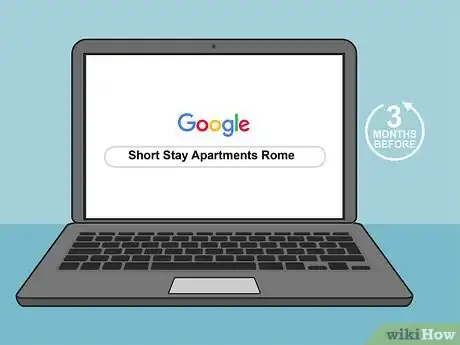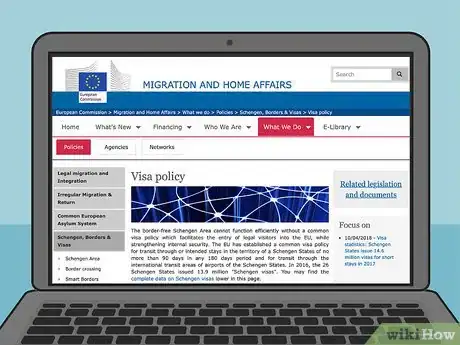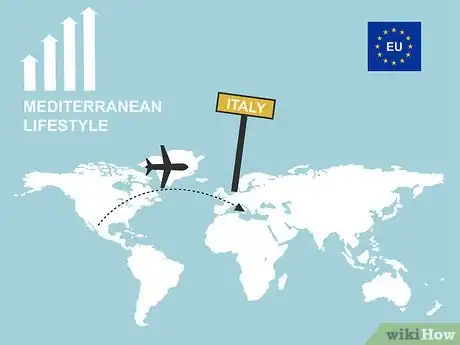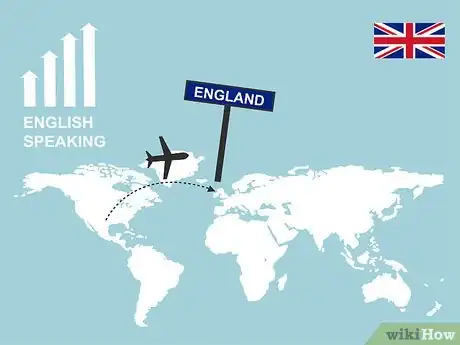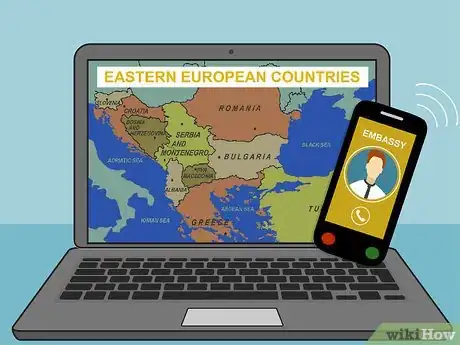This article was co-authored by Deirdre Nero and by wikiHow staff writer, Christopher M. Osborne, PhD. Deirdre D. Nero is an Immigration & Nationality Law Attorney and the Founder of NERO Immigration Law, P.L., based in Miami, Florida. With nearly 20 years of experience, she specializes in business-based immigration, family-based immigration, and naturalization. She earned her law degree from the University of Miami School of Law and her BA from Florida State University. In 2014, Deirdre won Business Immigration Lawyer of the Year–Florida in the Global Mobility & Immigration Awards given by Acquisition International. She’s also earned an AV Preeminent rating from Martindale-Hubbell, which annually rates lawyers on their abilities and ethics. Additionally, South Florida Legal Guide named her a Top Lawyer in South Florida several years in a row. In 2019, Deirdre was honored to receive the Outstanding Entrepreneur Award at the 2019 AXA Businesswoman of the Year Awards by the Coral Gables Chamber of Commerce and the Merrick in the Making Award by the Coral Gables Chamber of Commerce. In 2019 and 2021, Deirdre was named to Florida Trend Magazine’s Legal Elite.
This article has been viewed 28,405 times.
Europe is one of the wealthiest, most influential, and most diverse parts of the world, so it’s no wonder that you might think about moving there. Of course, “Europe” isn’t a single place—it’s a collection of over 40 nations, only some of which are in the European Union (EU). Each individual country—whether it’s inside or outside the EU—has its own rules and regulations for moving there, so make sure you do lots of research on the procedures before deciding where to move. You also need to make many practical and financial preparations well in advance of your move.
Steps
Making Initial Preparations
-
1Start saving money at least 1 year before moving. Most European countries are great places to live, but this comes at a cost. Research the cost of living in 5-10 possible destinations and use this as a benchmark for your savings target.[1]
- In most cases, you’ll be required to prove that you have adequate funds to support yourself for the duration of your stay, based on your visa.
- Don’t assume you’ll be able to quickly find a good-paying job in your European destination. Expect to have to rely on your savings for 3-6 months or more.
-
2Research European nations and determine your best fit. When you say, “I want to move to Europe,” you probably already have a list of one or several particular countries or cities in mind. Take the time to do ample research for the locations on your list, and whittle it down to your number one choice.
- Research online and read travel and guide books to get a “feel” for different locations in Europe. Which one best matches your situation and goals? Are you, for example, looking for a lower cost of living, more job opportunities, greater cultural diversity, or the chance to immerse yourself in a particular language?
- For practical information, contact the embassies of countries of interest.
- There are 44 nations on the European continent, with distinctive cultures, languages, and traditions. Some will suit you better than others.
Advertisement -
3Apply for a visa at least 6 months before departing. Contact the closest embassy for your chosen country and ask about the available visa options and processes. The alternatives and requirements will vary widely based on your current home country and citizenship, work or student status, and other factors.[2]
- If you’re a US citizen, for example, you can typically stay in EU nations for up to 90 days without a visa. If you want to stay longer, you’ll need a visa that’s suited to your circumstances.
- Work and study visas vary widely based on type and country, but often are valid for a range of between 3 months and 1 year.
- Work visas tend to be difficult to get from European nations, both inside and outside the EU. You may have better luck with a student visa, so consider looking for undergraduate or graduate study opportunities in your country of interest.[3]
- You can also speak with an immigration attorney to learn more about your specific visa options.
-
4Line up work, if possible, while applying for a visa. It can feel like a “Catch-22” to get a work visa from a European nation. It’s very hard to get a work visa without a job lined up, but it’s also very difficult to line up a job without a work visa. Your best-case scenario is to arrange for a job with an employer that will sponsor your work visa.
- If you’re a native English speaker, you may have better luck looking for work as a certified Teaching English as a Foreign Language (TEFL) instructor. Get certified in your home country before departing for Europe.
- While the particular rules and regulations vary by country, an employer may not be permitted to offer a job to a non-citizen unless they prove they can’t find a citizen that’s right for it.
- If you have a student visa, you may not be permitted to work in the country. Therefore, if you hope to move to Europe permanently, a work visa may be your better alternative.
Getting Ready to Move
-
1Work on learning the national language before you leave. If you speak English, you're in some luck, since it's spoken widely throughout Europe. That said, learning the national language of your destination will make it much easier to land a job, make friends, and integrate into the local and national culture.
- Try to develop at least a basic grasp of the language before moving. Give yourself at least 3 months (and better yet, 6-12 months) to practice.
-
2Consult experts to deal with banking and taxation matters. See if your current bank in your home country can help you arrange for a bank account in your destination country. Unless you’re sure you’re moving permanently, you’ll likely want to maintain accounts in both countries.
- When it comes to taxes, there’s a lot of paperwork you’ll need to wade through to make sure you’re paying all the necessary taxes in both your home and destination countries. While the embassy staff may be able to help, you’ll probably want to work with a tax attorney or accountant who has experience with European relocations.
- Don’t wait until the last minute to deal with these important matters. Start working on them at least 3 months before moving.
-
3Make sure you can drive in your country of choice. Some European countries will at least temporarily accept driving licenses from other countries, while others require an international driving license. Check the requirements for your destination country, and make sure your current license is valid and up-to-date.[4]
- Most EU nations will require you to take a driving test and get a license issued by them within a year.
- Automatic transmissions are much less common in Europe, so practice driving a manual transmission (stick shift) before you go!
- Public transportation tends to be great in Europe, especially in and around cities, so you may not need to drive at all.
-
4Find somewhere to live on a short-term lease. At least 2-3 months before you move, start searching online for an apartment or other living space in your European destination. Look for a place that suits your budget and, if possible, that offers a short-term lease of 6 months or fewer. That way, you can get a feel for the neighborhood before deciding if you want to commit to living there long-term.
- Living in Europe can be very expensive, especially in major cities. Get used to the idea of starting out in a very small apartment!
-
5Downsize your life before making your move. Space is usually at a premium throughout Europe. If you’re coming from the US, the roads, cars, stores, living quarters, home appliances, and even meal portion sizes will probably seem very small. Your best bet is to store or sell all but your most essential items to take with you on your move.[5]
- For instance, walk-in closets are very rare in Europe—in fact, closets of any type can be hard to find!
- Selling non-essential items is a good way to raise some money before moving.
Relocating to an EU Country
-
1Study EU-related regulations for visas, residency, and citizenship. If you move to a member state of the European Union (EU), obtaining legal residency status will permit you free movement throughout all member states. And, if you gain citizenship status in a member state, you’ll generally be able to relocate to other member states with relative ease.
- Each EU member state sets their own regulations for residency status and the citizenship process. The EU itself doesn’t grant citizenship.
- No matter which member state you move to, expect the process of obtaining citizenship to require a good bit of time (usually several years), money, and bureaucratic red tape.
- Note that the United Kingdom (UK) is still a member of the EU (as of March 2019), but is slated to leave the EU in the near future.
-
2Move to Germany if you want to be in Europe’s economic engine. Germany has several vibrant, modern cities, strong manufacturing and technology sectors, and more cultural diversity than you might initially assume. Contact the closest German embassy and do research online to get the information you need about moving there.
- While Germany isn’t all modern hustle-and-bustle, it may not necessarily provide the more laid-back lifestyle you may find more of in southern Europe.
- Germany offers several types of visas, as well as numerous types of residency permits for people who want to stay for longer periods of time.
- Lining up a job with a German employer will make it easier for you to obtain a visa.
- While many Germans speak English and other languages, take the time to learn at least basic German before moving.
-
3Pick France for its culture, cuisine, and beauty. France is one of the world’s most popular tourist destinations, and it’s a nice place to live as well! You might automatically think of Paris, but France is a large country that extends from the English Channel to the Mediterranean Sea.
- Start your research by contacting the nearest French embassy or consulate.
- French people tend to be very proud of their language, so you’ll definitely earn some points with the locals if you work on your French before moving.
- Paris and its surroundings offer the most work and study opportunities, but it’s also the most expensive part of France. You may find more affordable opportunities in other European cultural centers.
-
4Go to Italy to enjoy the Mediterranean lifestyle. Italy is not as economically strong or advanced as some of the European nations to its north, but it’s a nation full of cultural, historical, and natural wonders. Italians seem to have a special knack for enjoying life, and maybe that’s what you’re looking for!
- Italian work visas are very difficult to obtain, but student visas are fairly easy to get in comparison to other European countries.
- Northern Italy is generally more economically prosperous than southern Italy.
-
5Choose the Netherlands for an open and English-friendly culture. If you speak only English and want to move somewhere in Europe other than the UK, consider the Netherlands. English is widely spoken there, although you’ll find it easier to get a job, make friends, and navigate the country if you work on your Dutch language skills.
- If you’ve gotten a visa and plan to stay for more than 3 months, you need to register at the local town hall when you arrive. Get the necessary information from the nearest Dutch embassy before leaving for the Netherlands.
- The Netherlands is very flat and bike-friendly, which might appeal to you if you live an active lifestyle.
- The cost of living in the Netherlands is higher than in many southern and eastern European countries, so you’ll need to build up more savings before moving.
- Just to clarify: the name of the country is the Netherlands. Dutch is the language, and the name for the people. Holland is a region of the Netherlands.
Moving to a Non-EU Country
-
1Move to England or the UK for an English-speaking culture. Though people often conflate England with the United Kingdom, Wales, Scotland, and Northern Ireland also make up the UK. While the familiarity of the language and culture makes the UK appealing for English speakers, the country’s unclear status with the EU may make the decision to move there more difficult.
- The UK voted by popular referendum to leave the EU in 2016, but has not officially done so as of March 2019. All indications are that it will be leaving the EU, so assume that you’re moving to a non-EU country if you choose the UK.
- The UK offers a range of work and student visas, so look carefully at your options.
- If you don’t speak English, work on your language skills before departing.
-
2Choose Switzerland for natural beauty and high living standards. Switzerland is a stable, diverse, tolerant, economically advanced nation nestled in the heart of Europe, among the stunning mountain views of the Alps. It’s also not a member of the EU, and one of the most expensive countries in the world to live in.
- Switzerland has 4 official languages—German, French, Italian, and Romansh, but English is also widely spoken. Which language(s) you should learn will depend greatly on where in Switzerland you intend to live.
- Switzerland is home to many international organizations, which may present job opportunities based on your background and skills.
- While Switzerland is fairly welcoming to outsiders and offers a range of visa options, it is a rather lengthy and difficult process to obtain Swiss citizenship.
-
3Head to Norway to gain easier EU access in a non-member state. While it’s not officially in the EU, Norway is essentially an associate member in many respects, due to close economic and political links. Moving to Norway from an EU country is easy, but coming from outside of Europe will require you to get a visa and a residency permit.
- Becoming a legal resident of Norway, and especially a citizen, will make it easy for you to travel freely throughout the EU.
- Norway has a high standard of living and one of the world’s happiest populations (according to several studies), but the climate isn’t for everyone. Much of the country gets very cold and spends long stretches in darkness during the winter.
-
4Do online research and contact embassies for other non-EU states. Several eastern European countries, some nations in the Balkans (in and around the former Yugoslavia), and a few smaller nations scattered across Europe are also not part of the EU. If you are interested in moving to any of these countries, contact the closest embassy or consulate in your country for information.
Expert Interview
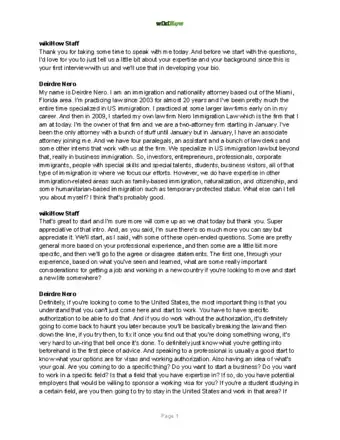
Thanks for reading our article! If you'd like to learn more about moving to Europe, check out our in-depth interview with Deirdre Nero.
References
- ↑ https://witanddelight.com/2018/10/considering-move-europe/
- ↑ https://www.transitionsabroad.com/publications/magazine/0503/before_moving_to_europe.shtml
- ↑ https://witanddelight.com/2018/10/considering-move-europe/
- ↑ https://www.transitionsabroad.com/publications/magazine/0503/before_moving_to_europe.shtml
- ↑ https://www.transitionsabroad.com/publications/magazine/0503/before_moving_to_europe.shtml

